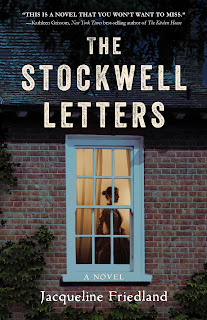Jacqueline Friedland is the author of the new novel The Stockwell Letters. Her other novels include Trouble the Water. She lives in Westchester, New York.
Q: What inspired you to write The Stockwell Letters?
A: When I was researching for my first novel, Trouble the Water, I stumbled upon the story of Anthony Burns. I was pulled in from just a few sentences about him in a very old article. Everything I read about him made clear that his story was an incredibly important piece of our country’s history, yet I had never heard of him.
He was the last fugitive slave ever returned to the South by the state of Massachusetts, and many people believe that his case was one of the final factors that incited the Civil War.
As someone who loves history and considers herself well informed about America’s past, I couldn’t believe that it was the first time I was learning about him. I felt that if I hadn’t learned about Anthony Burns before, there were probably many contemporary Americans in the same boat.
As I dug deeper, I learned about the female abolitionists who were also involved in this story, and I was fascinated. In particular, a woman named Ann Phillips, who had been married to a famous abolitionist, kept reappearing in my research. I knew I had to explore the connections between all these people and their moment of history and then share what I found with others.
Q: Your three protagonists include two historical figures and one fictional character. What did you see as the right balance between fiction and history as you were writing the book?
A: I truly believe that each of the historical figures portrayed in the book led lives sufficiently interesting that a novel written about only one of them would also have been a valid, worthwhile, and enormously engaging project.
What really fascinated me, though, was the interplay between the characters and how their stories related to each other. I brought in a third protagonist who was fictional only as a means of showcasing certain aspects of the other characters’ personalities. Sometimes having contrast or another perspective can help underscore points that a writer is making about the characters with whom another is interacting.
Q: How did you research the novel, and did you learn anything that especially surprised you?
A: Sadly, much of the information I discovered or confirmed in my research wasn’t a surprise at all. As someone who had already written one novel set in the antebellum South and who also studied much American history in her life, I was already well-aware of the atrocities and lack of humanity displayed by so many during that era.
The one thing that did surprise me was how much of a “small world” the abolitionist community was back then.
There were several cases during the era involving the Fugitive Slave Act that went to trial in Boston and became famous. Amazingly, in many of them, the same attorney represented the alleged fugitive, each alleged slave owner was also represented by the same counsel, and even crazier, the same judge presided in all these cases!
There were more examples of repeated appearances like this all throughout my research, and I still haven’t gotten over the surprise of it all!
Q: The writer Allison Pataki said of the book, “Showing both the best and the worst of human nature, Friedland’s writing prompts every reader to ask: How can I stand up for what is right?” What do you think of that description?
A: I’m thrilled by Allison Pataki’s description. I always thought, when I was growing up, that I would go into a profession where I was helping people as part of my daily work, like teaching or nursing, or something similar where I could go home at night and know that I had made a positive difference in someone’s life.
When I realized I was going to be a novelist, I remembered that thought from my youth and wondered if I was still doing something “good” for others. I decided that I do think authors help people in that fiction has the potential to spread certain messages and increase empathy among readers.
What more perfect way can you show someone what it’s like to walk in another shoes? What Pataki wrote about the book says that The Stockwell Letters does just that, and if my work inspires anybody to be kinder or more generous, in any way, I will be beyond delighted.
Q: What are you working on now?
A: I’m working on a dual timeline novel that takes place in the 1920s and current-day America. I don’t want to give much away yet, but I’m deep into a draft and extremely excited about it.
Q: Anything else we should know?
A: The Stockwell Letters is entirely different from all my other work, and I’m hoping that readers will be excited to check it out.
--Interview with Deborah Kalb
.jpg)

No comments:
Post a Comment